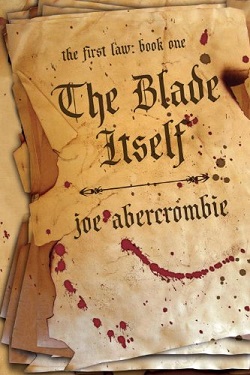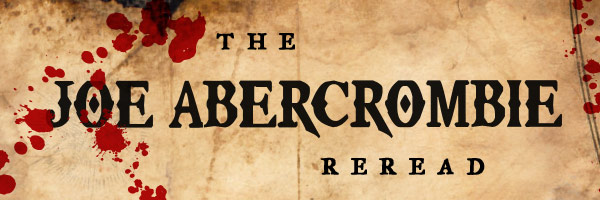Welcome to the officially unofficial reread of Joe Abercrombie’s The Blade Itself, and, unless I do something horrifically offensive, eventually the entire First Law Trilogy.
If you’re not familiar with Joe Abercrombie I ought to cast you into Tartarus. However, due to the constraints unfairly placed on me by Tor.com’s legal team, I’ve elected to educate rather than banish to hell. Consider yourself warned.
Abercrombie first came onto the scene in 2006 as a young (but not as young as Brent Weeks) and nice looking (but not as nice looking as China Miéville) film editor turned writer. His first manuscript, The Blade Itself, sold to Gollancz in the United Kingdom. It was brought to the United States by Pyr in 2008, by which time Abercrombie had already finished the trilogy in the UK with Before They Are Hanged and Last Argument of Kings. I offer these biographical details for two reasons: (a) it helps meet an artificial word count and (b) it demonstrates that Abercrombie came on the scene at an auspicious time.
In 2003 R. Scott Bakker published The Darkness that Comes Before. It was epic fantasy with an extreme over emphasis on the grimier aspects of storytelling. Some have called it grit. By the time Abercrombie’s novels began to profligate it seemed a new subgenre was born—grimdark. The trick with grimdark is trying to define it. Some call it realism. I think terms like that are a classic case of understatement. Grimdark is hyper-realistic, in a way that Kill Bill is hyper-violent. It’s a reality of absurdism, if you will.
Abercrombie in that paradigm is the quintessential absurdist, making him to grimdark as William Gibson is to cyberpunk—not the progenitor, but definitely the iconic practitioner. It’s often forgotten that novels like John Ford’s Web of Angels (1980) or even Philip K. Dick’s Do Androids Dream of Electric Sheep? laid the groundwork for Gibson’s ascension. I believe the same can be said for Robin Hobb’s Farseer Trilogy, Michael Moorcock’s Elric, and George R. R. Martin’s A Song of Ice and Fire, with regards to grimdark. But, just as cyberpunk wasn’t truly born until Gibson revved the engine in Neuromancer, it isn’t until Abercrombie’s A Blade Itself that grimdark truly finds its stride.
Interestingly, a mere seven years later, Abercrombie’s own Best Served Cold, Mark Lawrence’s Broken Empire Trilogy, and Kameron Hurley’s Bel Dame Apocrypha have taken grimdark to a place where I could argue the medium is exhausted. Authors like Richard Ford, KJ Parker (wonder what “this guy” thinks?), Luke Scull, and others are now working within a form, no longer taking it somewhere new. If such a statement is true, and grimdark has run its course, it seems an appropriate time to examine the master of the form—Joe Abercrombie.
Before I give us a taste of the actual reread with Abercrombie’s twisted version of a prologue, I want to emphasize what The Blade Itself and the First Law Trilogy are all about—beyond the fact that they’re the grimdarkiest of them all. At the basic level, Abercrombie is taking the epic fantasy thing and eating its lunch.
His primary points of view are a mercenary psychopath, a crippled torturer, and a self-impressed noble asswipe—and I’m being nice. There isn’t a likeable character in the entire series excepting the Dogman (we’ll talk about him later!). The kindly old magi in the tower is more like Gimli than Gandalf, and may actually be the villain, while the hero is… well, there is no hero.
In truth, the First Law Trilogy is a commentary on epic fantasy. It’s a response to Robert Jordan and a perfecting amendment to George R. R. Martin. And, ironically, it all begins with a quote from perhaps the first epic fantasy, Homer’s Odyssey:
“The blade itself incites to deeds of violence”
Onward….

Chapter Title: THE END
What happens:
The beauty of Joe Abercrombie is that so often chapters can be summed up like this: Logen Ninefingers avoids being murderalized and falls off a cliff.
The greater beauty of Joe Abercrombie is that chapters can also be summed up like this: Logen Ninefingers battles with some mysterious creatures called Shanka, who are something like orcs. He kills one by splitting its skull with his axe, but it gets stuck (as axes do) and, finding himself without a weapon, he ends up being tackled by the dead Shanka’s buddy.
Tackled over a cliff!
Hanging on to a root, with a Shanka dangling from his boot, Logen decides to take a leap into the river below rather than die on someone else’s terms.
I should be doing dramatic reenactments.
Key quotes:
“His fingers clutched, clutched at nothing. He was beginning to fall. He let go a little whimper.”
This is the first indication that we’re reading something different. Logen is tough. He just split a bad guy’s head open, and he’s… whimpering? Oh yes. There will be whimpering.
“Once you’ve got a task to do, it’s better to do it than to live with the fear of it.”
Not quite the iconic quotes that will come later in the book, but this is the beginning of one of Abercrombie’s thematic thrust—sometimes people do things because they have to, sometimes because they want to, but most often because it’s easiest.
Incoherence disguised as analysis:
The key component in this introduction to Logen Ninefingers and the First Law Trilogy begins with the title of the chapter. THE END. Is it the end of the story, like Basso’s prologue in KJ Parker’s The Folding Knife? The end of Logen’s life? The end of epic fantasy for the genre reader? Or some foreshadowing of things to come? Not surprisingly, I think it’s all of those things.
Abercrombie also throws us a big bone in the Shanka. A bestial and wild enemy that calls to mind the enemies of our erstwhile fantasy heroes of yore—orcs, and trolls, and trollocs, oh my! Are they going to play a prominent role throughout the series? Are the Shanka hordes going to invade the northland only to be fought off by brave knights protecting the innocent? Er… no.
The Shanka are a red herring of the highest order, one that remain a mystery to this day. Six books into Abercrombie’s world the Shanka remain completely unexplored. It’s the first trope The Blade Itself thumbs its nose at, and it won’t be the last.
Oh, right… SPOILER WARNING!! Guess what else? Logen isn’t dead.
Next week I’ll look at the first true point of view chapter for Logen, torturer extraordinaire Sand Dan Glotka, and grade-A jerk swordsman Jezal dan Luthar.
Justin Landon runs Staffer’s Book Review where his posts are less on-color. Find him on Twitter for meanderings on science fiction and fantasy, and to argue with him about whatever you just read.











And another reread I have to find time for.
Evil, evil, I say!
thanks – I loved these books an your sense of humor is wonderful – thanks again – I look forward to the rest of the articles —m
@mcl — you complimented my sense of humor, you’ve just earned ‘Most Favored Commenter’ status. This carries with it certain trade tariff exceptions as long as you don’t have any major human rights violations.
“Magi” is a plural noun; the singular is “mage” or “magus.”
@DocPedant — I beg to differ. It is traditionally plural, but in the mid-14th century came into use as singular borrowed from Old French in the meaning magician together with magic.
So says Wikipedia anyway. I admit I’m justifying after the fact, but who doesn’t like a grammatical slap fight every once in a while?
“There isn’t a likeable character in the entire series excepting the Dogman”
Logen Ninefingers isn’t likeable? I’ve no doubt he was an unbearable psychopath in his past and that some craziness remains, but, during the time period of these books, he seems pretty likeable. To the point where we are meant to like and care about him. Been awhile since I read this trilogy, so I may be mistaken.
@Kibs — Well… Abercrombie makes you root for him. I certainly like reading about him, but LIKE HIM? Like. . . . like like? No. No. Sorry. He’s pretty horrible despite having good intentions from time to time.
You could argue that the grimdark medium is exhausted? I’m wondering if you can clarify this a bit. Do you think that stories written in this vein from now on are worthless, pointless, etc.? Is a subgenre only as valuable as its newness? Just curious. Personally, I prefer grimdark to anything else going on in fantasy. Joe is by far my favorite writer of the stuff, but I think new writers (and old, should they choose) can still add to the delightfully wicked subgenre.
I’m still waiting for a true grimdark flintlock. I enjoyed Django Wexler’s debut very much, but it wasn’t anywhere near as dark as I thought it would be going in.
@JoR — Unpacking that statement would take another 1,000 words probably. But I’ll try. To me exhaustion doesn’t mean you can’t continue to write in it, or that what is written in it is less valuable, but that as a medium it’s no longer inventive or boundary pushing.
Grimdark is inherently reliant on ‘shock value’. I call it ‘absurdist realism’ in the post. It’s like using a shotgun to kill an ant. The overkill nature of grimdark helps it makes its point. Many novels have pushed the envelope so far that I’m not sure there’s any value gained in pushing it further. I do not mean that new stories told within a grimdark tradition are less good than their predecessors.
If that makes sense?
@Kibs
Well Abercrombie is obviously trying to get you to like Logen for most of the series. Honestly, that’s one of the big gut punches of the series, and another major way he turns tropes on their head.
For a while you sympathize with him and believe that he’s trying to do good and change and whatnot. But at some point, you realize that Logen really isn’t a good guy, and he’s just deceiving himself (and the reader because we’re in his head). He’s really a nasty guy and we probably shouldn’t have been rooting for him this whole time.